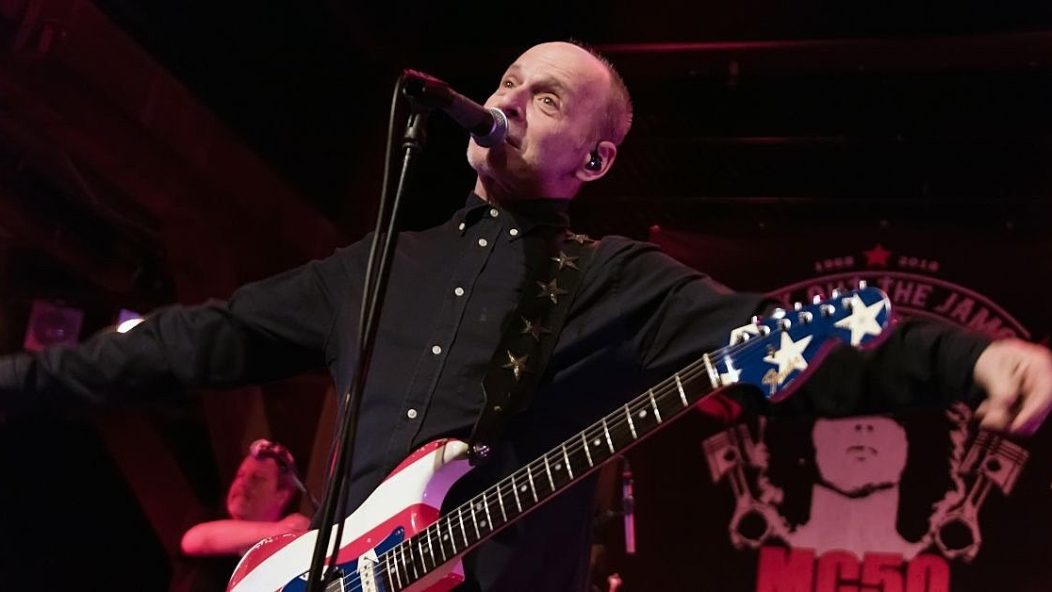
MC5's Wayne Kramer on why the protopunk legends reformed—interview
MC5 began in the Detroit suburb of Lincoln Park, Michigan in 1963. They were initially the classic American garage band, happy to play three sets per night of Rolling Stones, Chuck Berry and R&B covers in the area’s teen clubs for Cokes and Coney Islands afterward. Then they discovered ultra-loud amps, feedback, the higher energy/more aggressive R&B-based London bands such as the Who and the Yardbirds, free jazz, drugs and radical left-wing politics. They became something more potent, a call-to-arms for their generation from the stage of Detroit’s Grande Ballroom to “Kick out the jams, motherfuckers!”
Alongside “little brother band” the Stooges, they created the square root of hard rock, heavy metal and especially punk rock. You particularly feel MC5’s endless momentum anytime a band mix jacked-up, guitar-based rock ‘n’ roll with social protest, from the Clash to Rage Against The Machine to Green Day and beyond. More than a little of the credit goes to the 5’s founder, leader and lead guitarist Wayne Kramer.
Since the unfortunate burn-out of the classic MC5 lineup (Kramer, singer Rob Tyner, co-guitarist Fred “Sonic” Smith, bassist Michael Davis and drummer Dennis “Machine Gun” Thompson) in 1972, Kramer has lived a full, sometimes checkered life. He served two years in Lexington Federal Penitentiary on a cocaine charge, which led to his prisoners’ rights advocacy via his Jail Guitar Doors organization. He’s lent his viciously articulate guitar work to everyone from Was (Not Was) to G.G. Allin to fellow protopunk legend Johnny Thunders (in their short-lived band Gang War).
Read more: 11 bands that shaped Detroit punk, from MC5 to the White Stripes
He has enjoyed a distinguished solo career since 1995’s The Hard Stuff and his association with Epitaph Records, as well as a concurrent vocation scoring movies and TV series ranging from the Will Ferrell films Talladega Nights: The Ballad Of Ricky Bobby and Step Brothers to the acclaimed HBO comedy Eastbound & Down. He published a prominent memoir, The Hard Stuff: Dope, Crime, the MC5, and My Life of Impossibilities, in 2018. To commemorate the 50th anniversary of the classic MC5 debut album Kick Out The Jams, he toured the world that same year with an all-star band dubbed MC50 — himself, Soundgarden guitarist Kim Thayil, Fugazi drummer Brendan Canty, Faith No More bassist Billy Gould and Zen Guerrilla vocalist Marcus Durant.
Now comes word Kramer is reemerging post-COVID-19 with an all-new MC5 lineup, to inspire a new generation to action: Himself, singer Brad Brooks (Pollo Elastico), Jane’s Addiction drummer Stephen Perkins (replaced for this tour by Bob Dylan drummer Winston Watson, due to a family emergency), Mavis Staples bassist Vicki Randle and David Bowie guitarist Stevie Salas. They begin a two-week U.S. tour May 5 at Detroit’s El Club, and release two new tracks around that time, previewing a new album titled We Are All MC5, helmed by producer Bob Ezrin (Alice Cooper, Lou Reed, KISS). Featuring the participation of everyone from original MC5 drummer Thompson to Tom Morello, singer-songwriter Alejandro Escovedo and even Kesha, the album promises an exciting new chapter in MC5 history.
One of the things I have been asking in these interviews with punk legends is what the artists did during COVID. Well, we can see what you did during COVID — you reformed the MC5!
[Laughs.] Well yes, after some contemplation and depression and bottoming out on four years of a catastrophic Donald Trump presidency. Then pile on COVID on top of it — no gigging, virtually no scoring. I really enjoyed being home a lot and being with my wife and my kid. I really loved that part of it. But the rest of it got to me. So yeah, ultimately I started writing again and started pulling in some collaborators and partners, and entered some discussions. One thing led to another, and here we are.
Interesting, hearing that Trump was a catalyst for you to return to action. I remember an interview you gave to Tommy Stinson right at the beginning of the Trump presidency, where you said the system was designed to keep things status quo and that you didn’t think Trump would be able to do that much damage. How do you feel about that assessment now?
I couldn’t have been more wrong. I missed the target completely on that. I had no idea that his mental disorders would infect everything that he touched to the degree that they did. He profoundly damaged the country.
He did. He made it OK to tell any lie you wanted. And if you told it often enough, it becomes the truth. He made it OK to abuse the underdog. He gave permission to pillage everything decent.
He gave permission to all the assholes in the world to be assholes. He said it’s OK to be a racist. It’s OK to be a jerk. It’s OK to be a small-minded bigot. “I am. So if I am, you guys can be too. I’ll lead the way!”
Hopefully, it’s a brighter new day.
I’m not sure it is. Hope springs eternal, but while hope is a great breakfast, it’s a lousy dinner. Hope has to be backed up with action, and that speaks to the core reason to reignite the MC5. The band always represented an unlimited sense of possibilities and of action. We were talking about kicking out the jams. We weren’t talking about handing out the jams, or thinking about the jams. [Laughs.] We’re talking about taking action. The most powerful tool I have is my creativity, the art I create and the partners I surround myself with to work toward carrying the message of the MC5.
Today, we’re living in the most dangerous time I’ve experienced in the 74 years I’ve been on this planet. Because if we don’t step up, if we don’t take action during these upcoming midterms and in the presidential race in 2024? All the things that we love about living in America — and there are many — are gonna go away. We don’t have a special license from God that protects our democracy. Our democracy can go away just like a dozen Banana Republics have gone away. It’ll happen the same way. It won’t be one big thing — it’ll be a thousand little cuts. It’ll end with the nation bleeding out, and we’ll end up with secret police and controlled media and no rights and cruelty is the point.
If anybody wants an illustration in a microcosm, one only has to look at my home state, Texas. That’s been hard to live with, especially considering I live three miles from the epicenter of that poison.
We’ve got to organize, organize, organize. It’s like we’re in a fight, and only one side is fighting. And they are not joking. Those right-wing extremists, those people who took over the Capitol? They’re not joking — they’re serious.
Well, it’s hard to take them seriously when you see those invading the Capitol fronted by the guy in the Viking costume.
Well, the Dems and all the right-thinking people need to get busy and get in action.
The right gets in lockstep. They are all in agreement about their message and stick to it and hammer down on it. But the left? We’re so fucking scattered. We can’t agree on what is important. We can’t agree on taking on one issue at a time. And we are so fucking disorganized that we look like fools.
Yes, and it will be the left’s undoing. You think they would learn from Europe. They have multiparty systems, and the left is organized. I think it was in Israel where all the factions on the left said, “All right, we need to put all our differences aside and organize to get rid of…” I think it was a president or prime minister or someone in power. And they did it. First things first.
But there is no inherent evil in the Republican position of small government, balanced budget, adequate defense. I don’t have any quarrel with any of that. It’s the culture war issues where you lose me. And in that sense, there isn’t a whole lot of daylight between the Republicans and Democrats. They’re both beholden to big money and corporations. Corporations write our laws, and both parties are guilty of that. The money in politics, both parties are guilty of that. They’re not that different.
Yeah, I would just say that one is more blatant about its evil than the other, perhaps. I don’t know what to do about reforming any of that. I don’t know if it’s possible within our lifetime.
I wouldn’t think so. These things take forever to change. They can and they do change. But it takes millennia. I think it’s helpful to break it down into what you can do in your life and your work and your daily existence. I think it’s important to have these conversations with our friends, with our fellow workers, in our neighborhoods, in our communities, at the restaurant, at the coffee shop. Everything starts with a conversation. And there’s a lot of conversations we need to be having.
From that, options will grow. But I always try to break it down to, “In my own life, in my own world, what can I do today? What can I change?” Lack of power is my problem. If the world would do what I want it to do, we’d be fine. Or I’d burn it up. I’m not sure — one or the other. [Laughs.]
But what can I do? I cannot do everything. But I can do something. Let me figure that out. My work in the prisons is something I can do. Through my own efforts, I can bring programs into prisons. We just built a youth center here in Los Angeles, the CAPO Center — Community Arts Programming and Outreach. It’s for poor, mostly justice system-involved young people so they’ve got a place to go, they’ve got a place to study, a place to learn, a place to perform, a place to talk to older people who can present some ideas to them as alternatives to spending their adult lives in the California Department of Corrections. Those are things I can do.
Let’s talk about the MC5. One interesting thing here is that this is a completely new lineup. I saw the MC50 tour a few years back, and that featured one hell of a lineup. I thought for sure you’d be carrying that over to this.
Everybody’s busy. Everybody has their own bands. They stuck with me for about two years, which I think is the limit of a band’s life these days. At least a band that functions on the level that I do. I suppose that if you’re the Rolling Stones, it’s different. But I’m hardly the Rolling Stones. [Laughs.] Plus, I wanted to play with some new people.
Get some fresh blood, huh?
Yeah, and refine everything to the next level, ratchet it up even stronger with more deliberation and more refinement. Just see what the possibilities might be.
Both songs I’ve heard thus far present two different sides of the classic MC5 ethic. We know “Edge Of The Switchblade” from your first solo album, and it’s a really nice retooling of that song. It’s definitely got the energy of the 5. “Heavy Lifting” is a little closer to that really heavy song on Kick Out The Jams, “I Want You Right Now.” It’s definitely that side of the band.
I wrote it with Tom Morello and Brad Brooks, and the combination just ended up with that filter, that original concept of high-energy guitar rock. And that’s what you come up with.
It’ll certainly appeal more to the people who view MC5 less as a protopunk band and more as a protometal band.
There’s a bunch of good stuff on the rest of the record, and I’m sure there’ll be something on there that upsets everybody. [Laughs.]
That’s always been part of your function — to be a pot-stirrer. You worked with Bob Ezrin, an interesting choice. He’s produced a lot of great stuff over the years.
He sure has. He knows what he’s doing in the recording studio. He knows the process, and he truly has an open mind.
It’s interesting that you chose not to produce the album yourself. You are a quite capable producer.
Thank you. It was nice to have the option of having someone there carrying the weight. When you’re the chief writer, the bandleader and the producer, it’s a lot. So it’s nice to have someone there to kick ideas back and forth, take advantage of the wisdom he has acquired over his 50 years working in the recording studio.










